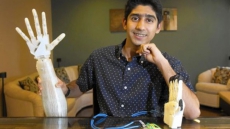NEW YORK — Donald Trump says the government must work with "brilliant people" in Silicon Valley to keep violent extremists offline, even if it means shutting down parts of the Internet.
But what he's proposing isn't possible with today's technology. And even if it were, such a move would likely hurt more than potential attackers, and it would hinder the government's ability to keep tabs on them.
Here's a look at Trump's idea and why it won't work:
WHAT TRUMP SAID
During Tuesday's Republican presidential debate, Trump said that because the extremist Islamic State group is using the Internet to recruit, the tech industry needs to find a way to stop them from doing that.
"ISIS is recruiting through the Internet. ISIS is using the Internet better than we are using the Internet, and it was our idea," Trump said. "What I wanted to do is I wanted to get our brilliant people from Silicon Valley and other places and figure out a way that ISIS cannot do what they're doing."
WHAT TRUMP PROPOSES
Trump went on to say that that he would be open to closing parts of the Internet that cover areas where the U.S. is at war or where IS operates, such as parts of Syria and Iraq. Even better, he said, would be to tap the brightest minds from the U.S. to infiltrate extremists' Internet gatherings and stay up on their activities — something U.S. intelligence agencies are already working at.
Trump isn't alone in calling on Silicon Valley's brainpower to figure out a way to keep violent extremists off social networks and messaging services. Democrat Hillary Clinton also has said the U.S. government and technologists should work together to block potential attackers from using the Internet to draw in new supporters.

FIRST OBSTACLE: THE INTERNET ITSELF
For one thing, the U.S. doesn't control the Internet. No one does.
Because the Internet is a global network of networks that are all owned by different governments, companies or individuals, "no one person owns it," said Charlie Baker, vice-president of product management for the Internet performance company Dyn.
ROUTING AROUND OBSTACLES
Ferreting out extremist groups and kicking them off the Internet in the U.S. just isn't realistic, given how rapidly the fluid Internet grows and changes. And the U.S. just doesn't have the technical ability to cut off Internet access in a country it doesn't control. (Military action might be a different story, although it presents difficulties of its own.)
Baker added that people have a long history of finding their way around Internet restrictions whether it's democracy activists in China or Iran, or tweens looking to circumvent their school's firewall.
THE PROBLEM WITH SOCIAL MEDIA
Groups such as IS have mastered social media for recruiting and spreading their message. Both Twitter and Facebook declined to comment on Trump's remarks, but say they don't tolerate posts that promote violence and aggressively remove such posts when reported by their users. Twitter bans accounts if they're linked to such activity.
BANNED-ACCOUNT WHACK-A-MOLE
But there's nothing stopping banned users from opening new accounts under different names, turning such efforts into the equivalent of "Whack-A-Mole."
So far, Internet companies have resisted pre-emptively blocking posts, partly because that would require them to make judgment calls about what constitutes terrorism — a definition that differs around the world.

THAT PESKY FIRST AMENDMENT
Any attempt to filter out the online activities of extremist groups would inevitably infringe on the First Amendment rights of Americans, said David Greene, civil liberties director for the Electronic Frontier Foundation.
"Even if you would accept the proposition that some of this speech is illegal, it's impossible to block just that out," Greene said. Any such move would probably also deny Americans access to information about what's going on in places such as Syria and Iraq, he said.
KEEPING EXTREMISTS CHATTERING
Greene notes that under the Constitution, the government is required to censor as little information as possible. But he added that this doesn't apply to people in other countries who don't have First Amendment protections.
The law enforcement and intelligence communities also have mixed feelings about shutting down terrorist chatter online. They say such chatter can help them monitor terrorist activities and could give them information needed to prevent a future attack.




